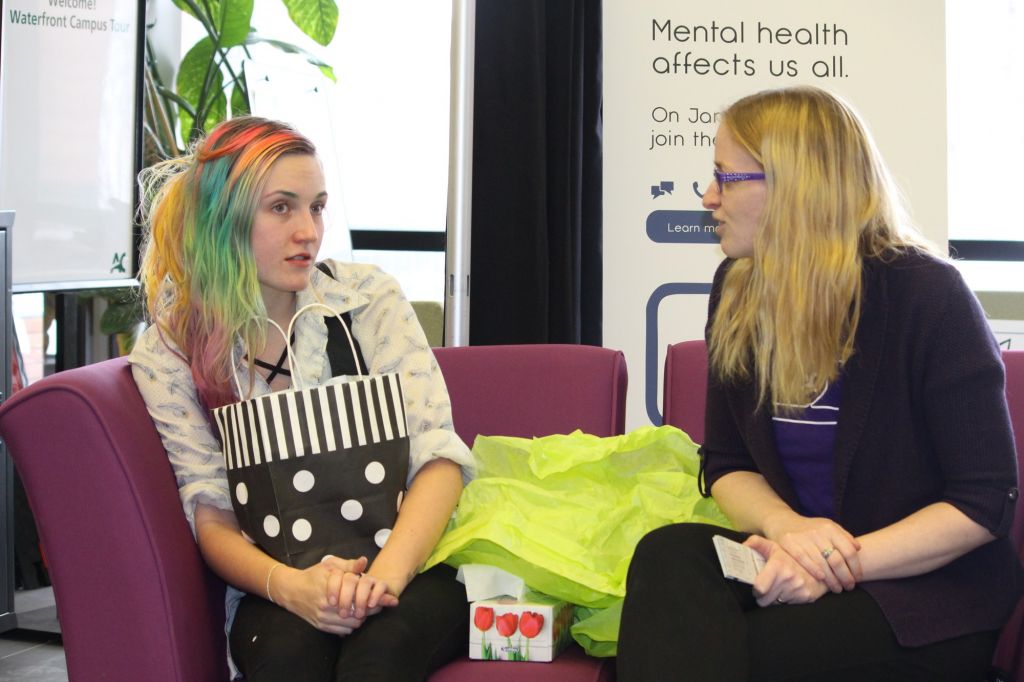Alanna Sterling, a petite woman with long, wavy, rainbow-coloured hair and matching eyebrows, stands on the small stage Jan. 31 at the far end of the Pembroke Campus’ commons room and introduces herself.
She is visibly nervous, talking fast and shaking, tears running down her cheeks. Sterling, 23, decides to pick up her guitar and play some music to settle her nerves before talking more about her mental health story with the few dozen students and staff that are there to listen.
“Music is my therapy,” admits Sterling, as she takes a deep breath and launches into a set. Her voice is strong, carrying through the building. Her words are full of the emotions and stories her songs tell for her.
She is far more comfortable with letting the music be the muse of her pain than she is talking about her life without the comfort of the notes and melodies to hold her. She nonetheless opens her soul and willingly shares some of her most painful stories.
“Feels like a therapy session,” Sterling says. “This is great!”
Sterling was recruited for Bell Let’s Talk Day by Nicole Lewis, counsellor at the Pembroke Campus, after she saw a series of photos John Wenzel produced of Sterling portraying her struggle with cutting. In particular, it was an image of her holding a razor blade between her lips.
Sterling admitted it was a very difficult photo to take, and the photo series has opened the door for her to be more vulnerable and outspoken about her many mental health struggles.
Sterling agreed to do the concert for Bell Let’s Talk Day because she wants everyone to feel comfortable being able to tell their stories. She doesn’t want anyone to be ashamed of whatever mental health diagnoses they may have.
“OCD is not an adjective,” Sterling says. “Not just upsetting, it’s literally crippling.”
Sterling wants to live in a world that understands and is accepting of mental health issues so that if she were to have one of her psychogenic seizures in public, she would receive the care and compassion she needs to work through it, instead of criticism and disbelief that psychogenic seizures are even a real medical issue.
Sterling has been in counselling since she was five. She has been in and out of foster homes, and her family is disconnected. There is a genetic component to her depression and mental health struggles that is compounded by the lack of stability in her childhood and other traumatic incidents in her life, including sexual trauma.
Sterling lists off a long list of diagnoses including OCD, anxiety disorder, manic depressive disorder, suicide ideations, insomnia and PTSD for multiple traumas. She has tried medications but didn’t find them helpful.
Her music and her art, she says, are her most effective outlet for dealing with her pain.
And so Sterling picks up her guitar again and starts playing another set, including a song she wrote just the week before. Afterwards she admits it’s not quite finished and hasn’t settled on a name yet, but it will probably be something about “I can forgive but I can’t forget.”
The audience is mesmerized by her story and her voice. “Really creative what she is doing,” said Tara Roddick, first-year bachelor of science and nursing student. “Not everyone can do that.”
An anonymous student yelled out as he headed for class, “You’re amazing, don’t ever forget that,” and he was gone.
Sterling graduated from the University of Ottawa, with a degree in biomedical science with a specialty in neuroscience, completely paid for by scholarships. She admits she is fascinated by everything and asks a lot of questions, like “how do I look at that on an anatomic level?”
She wants to understand mental health and why she does the things she does, and why others do the things they do, not just on a cellular but also cognitive and physical levels. But for now she just wants to see what life is like without school.
She performs two to three gigs a week here in Ottawa with her band the Silvers and she loves performing. They have also released a video of her song OCD, an example of how far she has come in taking back control of her life. Near the end of the song she is seen dropping her guitar pick and then badly messes up a chord but she keeps playing instead of freaking out. Sterling sees that as progress.
Sterling’s goal as part of doing this event for Bell Let’s Talk Day is that “society learns how f***ing real mental health is,” and that people begin to “see it as clearly as my physical features, maybe then they would understand.”
But she adds a note of optimism, that mental health does not make a person weak. In fact, it can be those very struggles that make a person strong and worthy and beautiful.
As she poses for one last picture with one of her art prints, Sterling’s own beauty and strength shine so brightly. It was a really hard day; Sterling has cried, a lot, but she did it and she expresses so much gratitude for the platform provided by Algonquin and the Pembroke Campus through Bell Let’s Talk Day for her to share her stories, be vulnerable and play her music.
“A whole year’s worth of crying in one day,” she says. “Collect the unicorn tears that come out of my face!”


